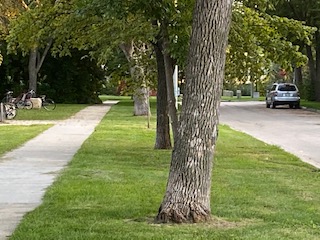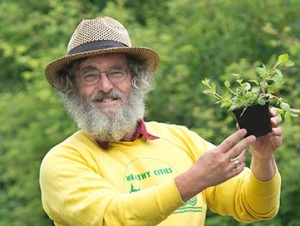Honouring a committed advocate and researcher who campaigned on behalf of the most vulnerable
SEPTEMBER 2018 – In this heartfelt and personal reflection, Anne Lindsey, a member of Cosmetic Pesticide Ban Manitoba, remembers Sandra Madray as a dedicated activist who was resolutely committed to the protection of human health from pesticides and other toxic chemicals in our environment.

Sandra Madray (family photo)
I went to visit a friend and colleague recently — someone I hadn’t seen for a while. Sandra Madray was in the final stages of cancer. She was dying. I was shocked and deeply saddened to see the physical changes the disease had wrought on my beautiful friend. She was so thin, and in so much pain.
Cancer is horrific in every circumstance, but the cruel irony in Sandra’s situation is that she worked much of her adult life in a volunteer capacity to prevent cancer and other illnesses — in particular, those caused by, and associated with, environmental and industrial chemicals.
As a co-founder (with Margaret Friesen) of the local group Chemical Sensitivities Manitoba and an adviser to the national organization Prevent Cancer Now, she participated as a citizen/environmental representative in countless government consultations on laws and regulations regarding chemicals.She sat on the National Stakeholder Advisory Council for the Chemicals Management Plan, and on the Canada-United States Regulatory Cooperation Council. She served on the board of the Manitoba Eco-Network for several years, and was active in the Children’s Health and Environment Partnership.

Sandra’s back garden (family photo)
Sandra educated herself (and others) on the science and public policy of chemical exposure and what it means for human health. Studying reams of documents, she did the arduous and often thankless work for which many of us have neither the patience nor the appetite, as we trust hopefully that our governments will make the right decisions in the public interest.

Sandra’s garden (family photo)
Because she did that work, she knew that our hopeful trust is misplaced and that most regulatory decisions about chemicals are not taken with the utmost care to protect health or the environment, but rather lean heavily toward maximizing commercial profits and expedience. She knew that as a result, we inhabit a chemical soup of hazardous exposures to pesticides, cosmetics, plastics, vehicle and power plant emissions and other byproducts of the hydrocarbon society.
Sandra’s cancer may or may not have been attributable to environmental or workplace exposures, but many cancers are, and in all those cases, the pain and suffering, the unmitigated sadness and loss for family and friends are probably preventable.
Always kind, generous and with good humour and deep conviction, Sandra used her knowledge to advocate tirelessly for better solutions to society’s problems. She campaigned especially for the most vulnerable — for children, the elderly, the chemically sensitive (of which she was one) and the immune-compromised. A quiet warrior, she never sought special recognition for her work.

Sandra’s garden (family photo)
Some of the efforts she engaged in were successful — one recent example being the Manitoba law to prohibit many chemical pesticides in lawn care. With her own urban yard — an oasis of gorgeous native plants, buzzing and bright with butterflies and pollinators — as an example of better, healthful solutions for green space management, she worked with a coalition of groups to end unnecessary exposures to so-called “cosmetic” pesticides, some of which are linked in epidemiological studies to a variety of diseases, including cancer, respiratory and neurological/developmental problems.
When Manitoba joined numerous other provinces in legislating against lawn chemicals, it was a small but significant step forward in preventive medicine.
It is beyond sad that in Manitoba, it now seems destined to be reversed. Even though recent polling shows most Manitobans consider pesticide-free to be the best approach, powerful forces support chemical solutions for weed control, and they appear to have the ear of the current government behind the scenes. Possibly acting on inside knowledge, one lawn company owner was quoted in Home Décor and Renovations magazine as saying that the regulation would be amended for 2019, and that he was optimistic that it would allow “licensed lawn care professionals to resume the use of more effective weed control products.” We can only surmise that he was referring to substances such as 2,4-D, dicamba and mecoprop.

Sandra’s front garden (family photo)
As citizens, not only must we make every effort to avoid unnecessary products like cosmetic pesticides and scents, we must also continue to encourage our government not to take this terribly backward step. In fact, it would actually be more appropriate to strengthen the law by adding glyphosate-based compounds, such as Roundup, a weed-control product with links to cancer, to the list of prohibited substances. Roundup’s sordid history of coverups by its manufacturer, including the fact that its carcinogenic properties were long known about and hidden, is steadily being revealed in court challenges brought by cancer victims.

Sandra’s garden (family photo)
Sandra will not be with us to see a possible reversal of the policy that she contributed to, and once again, have to endure the impacts of lawn pesticides on her chemically sensitive body. But if this change of policy comes to pass, so many will be affected, including the children and all the other vulnerable people she worked so hard to protect.How many of them will have to get sick and perhaps die before a clean, common-sense and precautionary approach to green spaces is adopted once and for all in Manitoba? For Sandra Madray’s sake, let this number be zero.
Sandra passed away on August 17 at 68 with her husband, Winston, and family members at her side.
Anne Lindsey is a former executive director of the Manitoba Eco-Network, a long-time activist on health and environmental issues, and a research associate with the Manitoba office of the Canadian Centre for Policy Alternatives.















